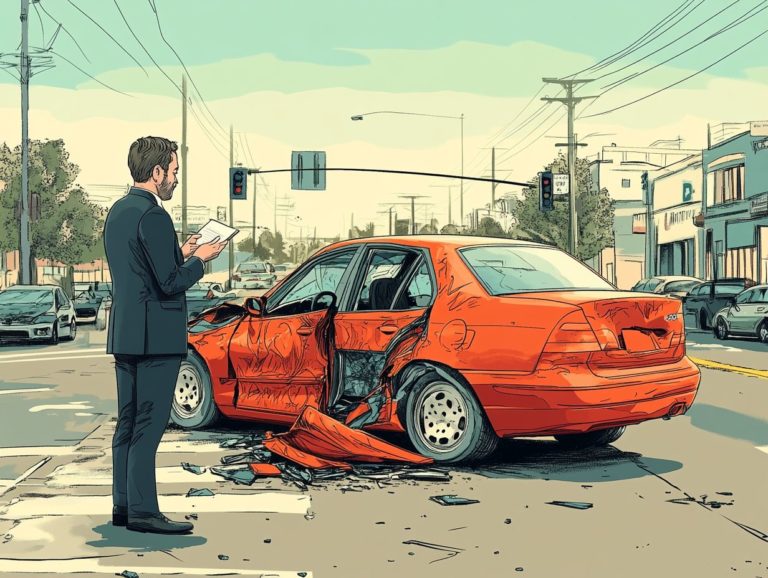The Impact of Fault on Your Auto Insurance Claim
Understanding fault in auto insurance claims is essential for you as a policyholder navigating the aftermath of an accident.
This article breaks down fault in auto insurance so you can navigate your claims confidently!
It sheds light on its importance and the two main systems no-fault and at-fault.
We ll explore the various factors that influence the determination of fault, including evidence and circumstances that matter.
You ll learn how fault impacts your claim, from coverage to compensation, and the steps to challenge a fault decision.
Whether you re an experienced driver or just starting, this guide provides valuable insights to help you manage your auto insurance claims with clarity and confidence.
Contents
- Key Takeaways:
- Understanding Fault in Auto Insurance Claims
- Types of Fault in Auto Insurance
- Factors That Determine Fault
- How Fault Affects Your Claim
- Challenging Fault Determinations
- Frequently Asked Questions
- What is considered fault in an auto insurance claim?
- How does fault affect my auto insurance claim?
- Can fault be shared in an auto insurance claim?
- What happens if I am found to be not at fault in an auto insurance claim?
- How can I prove that I am not at fault in an auto insurance claim?
- What happens if fault cannot be determined in an auto insurance claim?
Key Takeaways:
- Fault is crucial for determining coverage and compensation in auto insurance claims.
- There are two main types of fault systems: no-fault and at-fault.
- Evidence and circumstances are key in determining fault, and you can challenge fault decisions with appeals and legal help.
Understanding Fault in Auto Insurance Claims
Understanding fault in auto insurance claims is vital for navigating the complex world of insurance policies. The determination of fault affects factors like liability coverage, personal injury protection (PIP) which helps cover medical costs regardless of who caused the accident and how claims adjusters evaluate your situation. All these can influence your insurance rates.
Each state has its unique traffic laws governing fault rules, making it vital for you to familiarize yourself with these regulations to avoid pitfalls during claim submissions or disputes. Knowing whether you’re in an at-fault or no-fault accident can significantly impact your claims history and future insurance premiums.
Defining Fault and Its Role in Claims
Defining fault in auto insurance claims requires understanding the legal responsibilities each party has in a car accident. This influences how claims are processed and settled.
This concept is essential as it determines who is liable for damages and the scope of that liability. Claims adjusters review evidence such as police reports, witness statements, and traffic camera footage. Their evaluations form the backbone of the insurance process, guiding companies in making informed decisions about payouts and settlements.
The degree of fault assigned to each party plays a crucial role in the compensation you may receive, especially in places that follow comparative negligence, which looks at how fault is shared among drivers. This highlights the need for a thorough and unbiased evaluation process to ensure fairness in determining financial responsibility.
Types of Fault in Auto Insurance
Understanding the types of fault in auto insurance is crucial for you as a driver. These distinctions can greatly influence the outcomes of your claims, your liability, and even your insurance rates.
Comparing No-Fault and At-Fault Systems
The comparison between no-fault and at-fault insurance systems reveals key differences in how claims are managed after a car accident.
In a no-fault system, you generally seek compensation from your own insurance for medical expenses and lost wages, regardless of who caused the accident. This can streamline the claims process but may limit your ability to pursue additional damages from the at-fault driver.
Conversely, in an at-fault system, the insurance of the responsible party covers the injuries and damages incurred by victims, often offering broader recovery options.
State laws significantly shape these systems, affecting personal injury protection (PIP) requirements and overall insurance premiums. Therefore, you must navigate varying laws that can directly impact your financial responsibilities and coverage choices.
Factors That Determine Fault
Multiple factors determine fault in auto insurance claims. Consider adherence to traffic laws, the collection of evidence, and the thoroughness of claims adjusters during evaluation.
Each of these elements plays a crucial role in shaping the outcome of your claim.
Evidence and Circumstantial Factors
Collecting evidence and assessing related situations are key to determining who is at fault in auto insurance claims, influencing liability coverage and compensation.
As you navigate this intricate process, various types of evidence come into play. Police reports detail the incident’s circumstances, witness statements offer firsthand accounts, and photographs capture the scene and vehicle damages. Each element is vital for claims adjusters, who carefully analyze this information while considering applicable traffic laws.
By evaluating how these factors intersect, they strive to arrive at a well-informed conclusion regarding responsibility.
The thoroughness of this analysis can significantly impact the outcome of your claim and the compensation you may receive if you find yourself injured.
How Fault Affects Your Claim
The determination of fault is crucial in shaping your claim’s outcome, influencing aspects such as liability coverage and the compensation amount you may rightfully receive for vehicle damage and injuries incurred in an accident.
Understanding this can significantly impact your approach and expectations throughout the claims process.
Impact on Coverage and Compensation
Fault significantly impacts your coverage and compensation, determining whether you secure the financial support you need for medical bills and property damage.
When an accident occurs, how fault is assigned plays a crucial role in shaping the available coverage under various insurance policies, including personal injury protection. PIP typically covers medical expenses regardless of who is at fault, but there are instances where fault can limit the extent of your compensation. This determination can directly influence the financial relief you receive for ongoing treatment and recovery.
If your claim is denied or the compensation is insufficient, you may have to navigate a complicated appeals process with the insurance company. Understanding these nuances can ultimately make a substantial difference in your pursuit of fair compensation for your injuries.
Challenging Fault Determinations
As a policyholder, challenging fault determinations is essential, especially when you disagree with the conclusions drawn by claims adjusters or insurance companies regarding your involvement in a car accident.
Appealing Fault Decisions and Seeking Legal Help
Appealing fault decisions requires a deep understanding of the claims process, often making it essential for you to seek legal assistance to navigate the intricate web of insurance regulations.
Your journey begins with gathering all pertinent evidence and documentation think police reports, photographs of the accident scene, and witness statements. Each piece is vital in establishing the facts surrounding the incident and bolstering your appeal.
Having legal representation can be a game changer when negotiating with insurance companies. Seasoned attorneys possess keen insight into the nuances of Personal Injury Protection (PIP) insurance, allowing them to advocate effectively for the compensation you deserve.
Being well-versed in the complexities of PIP ensures that you maximize your benefits, helping you recover what is rightfully yours while alleviating the stress often associated with dealing with insurers.
Frequently Asked Questions
What is considered fault in an auto insurance claim?
Fault means who caused the accident. Investigating the circumstances helps find out who is responsible.
How does fault affect my auto insurance claim?
Fault plays a significant role in determining the outcome of your auto insurance claim. If the accident was determined to be your fault, your insurance premiums may increase, and you may be responsible for paying a deductible for repairs or damages.
Yes, fault can be shared in an auto insurance claim. In some cases, both parties involved in the accident may be found partially at fault. This is known as comparative negligence and can affect the amount of compensation you receive from your insurance company.
If you have questions about your claim or need assistance, reach out to an expert today!
What happens if I am found to be not at fault in an auto insurance claim?
If you re found not at fault, you won t have to pay a dime! Your insurance will cover repairs.
You can also ask the other party s insurance for money.
How can I prove that I am not at fault in an auto insurance claim?
Gathering evidence is key to showing you re not at fault. This includes witness statements, photos of the accident scene, and police reports.
Your insurance company will also conduct its own investigation to determine fault.
What happens if fault cannot be determined in an auto insurance claim?
Sometimes, fault can’t be determined. This may happen if there s conflicting evidence or unclear circumstances.
If that s the case, both parties might have to cover their own damages, and insurance premiums may still be affected.



